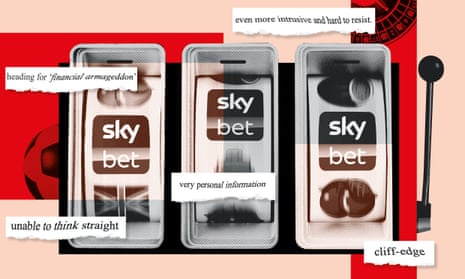Paddy Power argued that what is shown on the screen to a customer playing online slots is irrelevant ‘wallpaper’. A gardener who says she made herself a millionaire with one spin of an online slot machine - only to be told "computer says no" - is fighting betting giants Paddy Power in court for her money. Corrinne Durber, a gardener and keen golfer from Gloucestershire, was told she had won the "monster jackpot" of £1,097,132.71 whilst playing Paddy Power's Alice in Wonderland-themed online slot game "The Wild Hatter" during the Covid pandemic in October 2020.
![[The Wild Hatter slots]](https://static.independent.co.uk/2025/02/06/11/WildHatter1.jpg)
But her account was only credited with £20,265.14, with the gambling company explaining when she complained that an error had led to a mismatch between the "monster jackpot" result that was shown to her by an arrow on her screen and the result determined by the central computer server at Paddy Power HQ. The bookies went on to show Mrs Durbar a 45-page rulebook of terms and conditions, which they claimed justified their decision not to pay out her £1m-plus jackpot.
![[The game features an additional bonus ‘jackpot game’]](https://static.independent.co.uk/2025/02/06/11/WildHatter3.jpg)
Now she is suing the company which owns Paddy Power, PPB Entertainment Ltd, at London's High Court, arguing that the refusal to pay out breaks the game's rules. "The rules here says what you see is what you get," her barrister Mark Baldock told Mr Justice Ritchie. But Philip Hinks, for Paddy Power, insisted that what is shown on the screen to a customer playing online slots is irrelevant "wallpaper," with the only meaningful action being the hidden generation of a random number by the host company's central computer.
![[Paddy Power showed Mrs Durbar a 45-page rulebook of terms and conditions]](https://static.independent.co.uk/2025/02/06/11/CorrinneDurber4.jpg)
"The wheel is only an entertainment feature, he said. "It's a bit more fun. It doesn't determine anything.". The court heard that Mrs Durber's win came on October 18, 2020, whilst the "three-tier" system of Covid restrictions was in place and just prior to the imposition of the second full national lockdown. The game - described in one online review as "a zany, off the hook Wonderland driven slot" - is based around a 5x4 fruit machine style grid, in which players hope to match winning symbols.
The game features an additional bonus "jackpot game," which can be triggered by matching three jackpot symbols - which is exactly what Mrs Durber did, her barrister told the judge. "According to the game rules, Mrs Durber then had to 'spin the jackpot wheel to determine which of the offered jackpot tiers will be won'," he said. "This is what she did. The jackpot wheel, once spun, showed Mrs Durber that she had won the 'Monster Jackpot' i.e. £1,097,132.71.
"However Mrs Durber's account with the defendant was only credited with the considerably lesser sum of the 'Daily Jackpot' £20,265.14. "Despite having played the game according to the game rules, what Mrs Durber had in fact won was the daily jackpot. That was the result by the random number generation as recorded on the records hosted on Paddy Power's server.". The court was told that Paddy Power is relying on the terms and conditions of their online games, which state that the customer "fully accepts and agrees that random number generator software will determine all outcomes of the game" and that the bookie "will not be liable" for payouts offered as a result of "systems or communication errors".
Asking for Paddy Power's defence to be struck out and summary judgment granted for Mrs Durber, her barrister said that the terms and conditions relied on by the bookmaker "were not sufficiently brought to Mrs Durber's attention," are "unenforceable" because they clash with Mrs Durber's rights in relation to online purchases under the Consumer Rights Act 2015, and that they also clash with Paddy Power's own game rules for the Wild Hatter slot.
Mr Baldock told the judge: "The terms and conditions are a 45-page document. It's evidence of how murky these matters really are when you look at the 45 pages. "There is an invitation to spin the jackpot wheel to determine what you win. She wins big then she is told: 'sorry you didn't.'. "The rules here say what you see is what you get. How can the customer be invited to determine what happens and at the same time the random number generator has (already) determined what happens?.
"There is a fundamental inconsistency and, in these circumstances, the game rules have to prevail. "My case is what you see is what you get. Digital content has to be as described. "This is all about risk. If the defendant has not got its house in order, why should the responsibility fall on my client's shoulders?". He argued that Paddy Power were in effect seeking to "avoid" Mrs Durber's bet. "Somebody incorrectly mapped the software to the pot," he said. "That's not a system or computer error, its a human error.".
The judge, commenting on his submissions, said: "Customers expect what you see is what you get. Here, what you see is what you don't get. "How would you like to win a million quid, then have it taken away? It's a matter of fairness and logic, you would say.". The judge described the determination of the result by the random number generator as, "some sort of secret squirrel thing," adding, "I don't understand how the random number generator operates and how it connects with the server.".






















